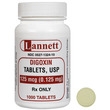Pronunciation
deye-JOX-in - Pronunciation guide
Brand Names
- Lannett
- Lanoxin
Description
 Digoxin is a digitalis glycoside that has a direct effect on cardiac muscle and the electrical conduction in the heart. It increases cardiac output by increasing myocardial contractility. Digoxin helps decrease sympathetic tone, and as a result, causes increased diuresis and a reduction of edema. This results in a reduction of heart size, heart rate, blood volume, and pulmonary and venous pressures.
Digoxin is a digitalis glycoside that has a direct effect on cardiac muscle and the electrical conduction in the heart. It increases cardiac output by increasing myocardial contractility. Digoxin helps decrease sympathetic tone, and as a result, causes increased diuresis and a reduction of edema. This results in a reduction of heart size, heart rate, blood volume, and pulmonary and venous pressures.
Usage
Digoxin is used in the treatment of congestive heart failure in horses, usually in conjunction with other medications, including diuretics, and angiotensin convertin (ACE) inhibitors.
Dosage and Administration
 Cyproheptadine Cyproheptadine |
||||
|---|---|---|---|---|
| Method | Dosage (click row for calculator) |
Concentration | Period | Duration |
| Oral | 0.011 mg/kg | 0.250 mg/tablet | Twice daily | NA |
| Intravenous injection | 0.0022 mg/kg | 0.25 mg/ml | Twice daily | NA |
Notes:
|
||||
Side Effects
The most common side effects are due to digitalis toxicity that may result in arrhythmias, including heart block paroxysmal atrial, or ventricular tachycardias, and multifocal premature ventricular contractions.
Digitalis toxicity may lead to gastrointestinal side effects, including anorexia, nausea, and diarrhea.
Other side effects include central nervous system disturbances, unsteady gait, and depression.
Precautions
Use of digitoxin requires careful monitoring under the direction of a veterinarian. With a narrow margin of safety and a significant variation in absorption among horses, prevention of toxicity is very important.
Digoxin is excreted by the kidneys and the dose may need to be lowered for horses with renal disease.
Digoxin should not be used in horses with ventricular fibrillation or digitalis intoxication.
Digoxin is not FDA approved for use in horses, but is common accepted practice. U. S. federal law restricts this drug to use by or on the lawful written or oral order of a licensed veterinarian.
Digoxin is either a regulated or prohibited substance in most sanctioned competitions. It is important to check with the proper individual regulatory group.
Interactions
Antacids, cimetidine, metoclopramide, oral neomycin, and penicillamine may decrease digoxin absorption.
Diazepam, quinidine, anticholinergics, succinycholine, verapamil, tetracycline, and erythromycin may lead to increases in digoxin levels.
Drugs that decrease serum potassium may predispose horses to digoxin toxicity. They include diuretics, amphotericin B, corticosteroids, ACTH, some laxatives, glucagon, dextrose, or dextrose/insulin infusion, and sodium polystyrene sulfonate.
Overdose
Overdose may result in chronic toxicity with effects noted in above-listed side effects. Acute toxicity due to ingestion may be treated by emptying the stomach and using activated charcoal.
Images
 Lannett Digoxin Tablets
Lannett Digoxin Tablets
 Lanoxin Digoxin Tablets
Lanoxin Digoxin Tablets
Literature
